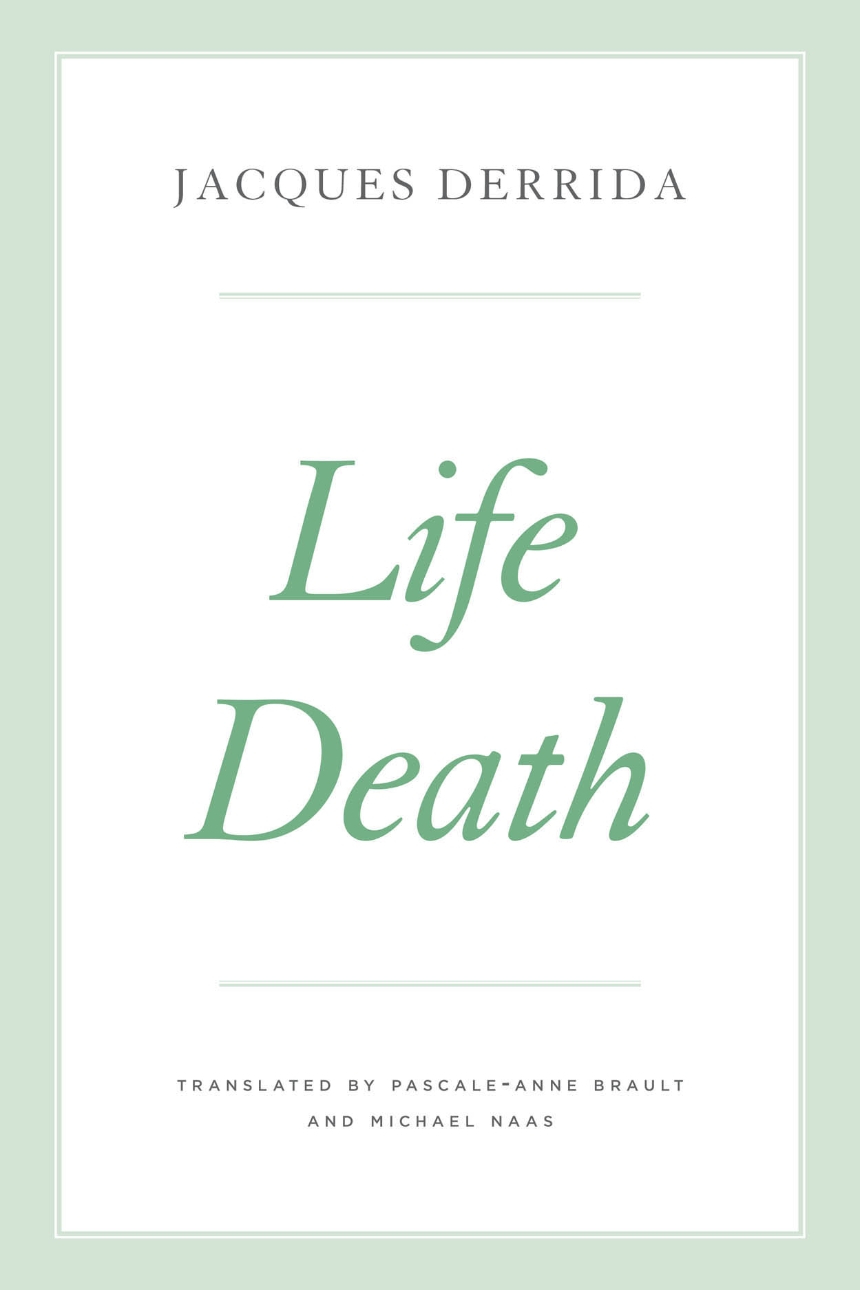Life Death
The seventh in our series of Derrida's seminars, Life Death provides interdisciplinary reflections on the relationship of life and death—now in paperback.
One of Jacques Derrida’s most provocative works, Life Death deconstructs a deeply rooted dichotomy of Western thought: life and death. In rethinking the relationship between life and death, Derrida undertakes a multi-disciplinary analysis of a range of topics across philosophy, linguistics, and the life sciences. Derrida gave this seminar over fourteen sessions between 1975 and 1976 at the École normale supérieure in Paris to prepare students for the agrégation, a notoriously competitive exam. The theme for the exam that year was “Life and Death,” but Derrida made a critical modification to the title by dropping the coordinating conjunction. The resulting title of Life Death poses a philosophical question about the close relationship between life and death. Through close readings of Freudian psychoanalysis, the philosophy of Nietzsche and Heidegger, French geneticist François Jacob, and epistemologist Georges Canguilhem, Derrida argues that death must be considered neither as the opposite of life nor as the truth or fulfillment of it, but rather as that which both limits life and makes it possible. Derrida thus not only questions traditional understandings of the relationship between life and death but also ultimately develops a new way of thinking about what he calls “life death.”
One of Jacques Derrida’s most provocative works, Life Death deconstructs a deeply rooted dichotomy of Western thought: life and death. In rethinking the relationship between life and death, Derrida undertakes a multi-disciplinary analysis of a range of topics across philosophy, linguistics, and the life sciences. Derrida gave this seminar over fourteen sessions between 1975 and 1976 at the École normale supérieure in Paris to prepare students for the agrégation, a notoriously competitive exam. The theme for the exam that year was “Life and Death,” but Derrida made a critical modification to the title by dropping the coordinating conjunction. The resulting title of Life Death poses a philosophical question about the close relationship between life and death. Through close readings of Freudian psychoanalysis, the philosophy of Nietzsche and Heidegger, French geneticist François Jacob, and epistemologist Georges Canguilhem, Derrida argues that death must be considered neither as the opposite of life nor as the truth or fulfillment of it, but rather as that which both limits life and makes it possible. Derrida thus not only questions traditional understandings of the relationship between life and death but also ultimately develops a new way of thinking about what he calls “life death.”
328 pages | 6 x 9 | © 2020
The Seminars of Jacques Derrida
Philosophy: General Philosophy, History and Classic Works
Reviews
Table of Contents
Foreword to the English Edition
General Introduction to the French Edition
Editorial Note
Translators’ Note
General Introduction to the French Edition
Editorial Note
Translators’ Note
First Session: Programs
Second Session: Logic of the Living (She the Living)
Third Session: Transition (Oedipus’s Faux Pas)
Fourth Session: The Logic of the Supplement: The Supplement of the Other, of Death, of Meaning, of Life
Fifth Session: The Indefatigable
Sixth Session: The “Limping” Model: The Story of the Colossus
Seventh Session
Eighth Session: Cause (“Nietzsche”)
Ninth Session: Of Interpretation
Tenth Session: Thinking the Division of Labor—and the Contagion of the Proper Name
Eleventh Session: The Escalade—of the Devil in Person
Twelfth Session: Freud’s Leg(acies)
Thirteenth Session: Sidestep Detour: Thesis, Hypothesis, Prosthesis
Fourteenth Session: Tightenings
Index of Proper Names
